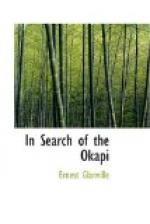“Peace be with you,” said Mr. Hume, in Arab.
“And with you, also,” replied the old man, in a thin voice. “Haste, my son!”—this to the paddler. “They are white men, such as I have spoken of.”
The canoe gradually drew near, and the old man held out a shaking hand to be helped on board the larger boat; but the wild man remained in his dug-out. The old man told his story slowly in a strange dialect understood by Muata, and the purport of it was that the cannibals had surprised the village at dawn, killed all the men with the exception of themselves, and had gone off with the women.
It was a familiar story to Muata, and he related it coldly; but his indifference did not last very long. It was plain that the old man was not of the same race as his companion, and when the two had eaten, Compton asked the old chap how he came to wear a fez and speak Arabic.
“It is the speech of my fathers, effendi,” he said, turning his smoke-bleared eyes on the young face.
“And how came it that an Arab was dwelling with the river-people?” asked Muata. “Sooner would I have looked for an old wolf living at peace with the goats.”
The Arab withdrew his gaze from Compton and fastened it on the otter outlined on the chiefs breast. With a skinny finger he pointed at the chief.
“Allah is great,” he said. “This is his work; and you will follow on the track of the man-eaters.”
“Save your speech, old man, for we work not for river-people; and you forget the arrow that was loosed at us.”
“This one loosed it in rage at the loss of his wife, mistaking you for wolves; but, even so, it was as Allah willed, for the arrow warned you of our presence.”
“You speak in circles, my friend,” said Compton. “Show us the finger of Allah in this matter?”
“This,” said the old man, solemnly, placing his finger on Muata’s breast, “is he they call the River Wolf, the son of the wise woman, the warrior who will follow the track of the man-eaters.”
“What know ye of the wise woman?” demanded the chief.
“We talked together, she and I, at the village that is burnt, of the days when Muata was a babe in her arms, when these limbs of mine were strong to do service for a white man, whose voice was the voice of the young effendi.”
“And where now is the wise woman, old man?”
“It is four days since the cannibals left. Tell me where they would be, O warrior, for the forest is your hunting-ground.”
Muata lowered his eyelids, and took the news of his mother’s capture by the cannibals in silence; but Compton was burning with excitement at the reference to the white man.
“What white man was that you spoke of? I look for such a one.”
“Men search not for the dead, effendi.”
“But for signs of the dead—for the place of his burial, for the book he wrote, for the things he left.”




